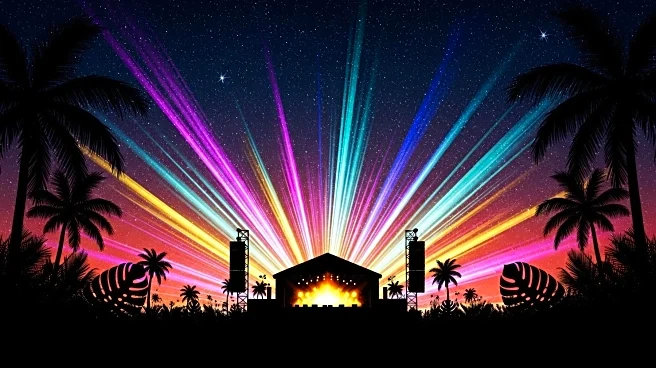What's Happening?
Sabrina Carpenter is set to headline the 2026 editions of Lollapalooza in Chile, Argentina, and Brazil. The announcement was made on August 28, detailing the full lineups for the festivals. Carpenter will be joined by other headliners such as Tyler, The Creator, Chappell Roan, Deftones, Skrillex, Lorde, and others. Lollapalooza Chile will occur from March 13-15 at Parque O’Higgins in Santiago, while Lollapalooza Argentina will take place at the Hipódromo de San Isidro in Buenos Aires during the same weekend. Lollapalooza Brazil is scheduled for March 20-22 at the Autódromo de Interlagos in São Paulo. This marks Carpenter's debut in Chile and her return to Argentina, where she previously opened for Taylor Swift's Eras Tour in 2023.
Why It's Important?
The inclusion of Sabrina Carpenter as a headliner in these major South American music festivals underscores her rising prominence in the global music scene. Her participation highlights the growing influence of American pop artists in international markets, particularly in Latin America. This development is significant for the music industry as it reflects the expanding reach and cultural exchange facilitated by such festivals. It also provides a platform for artists to connect with diverse audiences, potentially leading to increased international collaborations and market opportunities.
What's Next?
As the festivals approach, fans can expect further announcements regarding ticket sales and additional performers. The events will likely attract significant attention from music enthusiasts across the region, boosting tourism and local economies. Organizers may also focus on enhancing festival experiences through innovative stage designs and interactive elements to cater to the diverse audience. Artists like Sabrina Carpenter may leverage these performances to expand their fan base and explore new musical collaborations.
Beyond the Headlines
Lollapalooza's expansion into South America reflects broader trends in the music industry, where festivals serve as cultural bridges between regions. This can lead to increased cultural exchange and understanding, fostering a sense of global community through music. Additionally, the presence of diverse artists at these festivals highlights the industry's commitment to inclusivity and representation, offering a platform for varied musical genres and voices.








